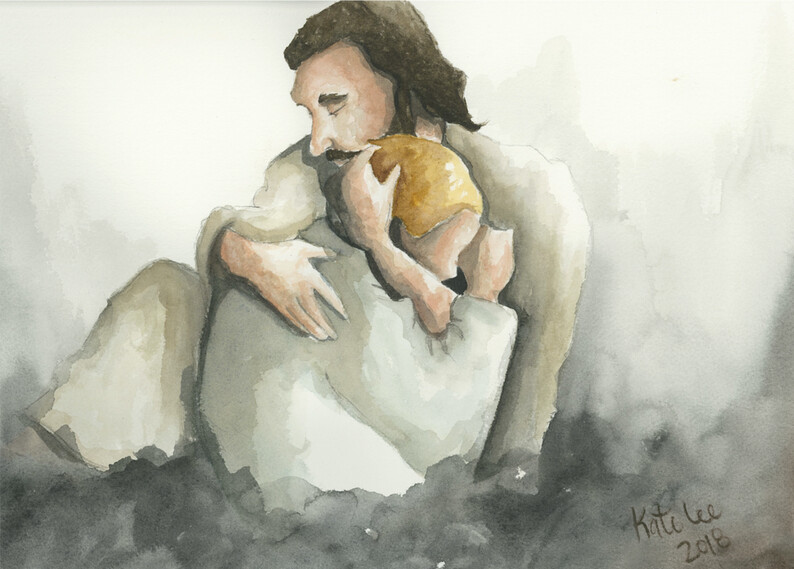Editor’s note: This article discusses child loss.
My two-year-old daughter, Elora, had been sick all afternoon—pale and shaky, with a sour stomach. After five baths and changes of pajamas, she’d finally fallen asleep. But as I lay beside her on my bed, Elora suffered a massive seizure and wouldn’t wake up.
My husband and I rushed Elora to the emergency room, where the doctor discovered a cancerous brain tumor. Doctors, nurses, and surgeons fought to save Elora’s life. But after CPR, emergency surgeries, and other difficult procedures, Elora’s body was too broken, and she died just 30 short hours after that first seizure.
Unbearable Grief
My heart was shattered. I didn’t know how to keep living now that my daughter’s life had ended. Grief consumed me. For weeks after Elora’s funeral, I spiraled into the darkness of pain, sorrow, and guilt until I was no longer able to help myself out of it. I desperately needed help. Professional counseling, support groups, and other grief resources were all needed. But those would also take time, and I didn’t know if I could endure one more day in bitter darkness. I needed help now. That’s when I realized that in the haze of my grief, I’d missed one of the most immediate sources of comfort and healing available. I picked up my scriptures and turned to Christ.
The Scriptures Provide Answers
I devoured God’s word, reading familiar verses and stories with new eyes and new needs. I asked Him to guide me to sections of scripture that He knew would help me. What did I learn? He taught me to find peace, trust promises of comfort and companionship, and how to access Christ’s atonement. But most remarkably, He reminded me that even Jesus experienced grief. The stories of His life are a manual for how to mourn personally and support those who mourn (see Mosiah 18:9). Jesus did not hide from grief but let Himself sorrow for and with those He loved, and so can we. Here are five things we can learn from Christ’s example.
Jesus Wept
When Lazarus fell sick, Mary and Martha sent word to Jesus, hoping He would come to heal their brother. But Jesus did not arrive in time. The sisters lamented, “Lord, if thou hadst been here, my brother had not died” (John 11:21; 11:32).
Mary and Martha did not yet know that Jesus had the power to raise the dead. He was about to make everything right, and still, He let them mourn. He did not chastise their tears or question their faith. Instead, “Jesus wept” (John 11:35). He stood beside them in their grief and cried.
Because of Jesus Christ, our loved ones, too, will be resurrected, but that doctrine does not erase the sorrow we feel when someone dies.
Jesus wept, and so can we.
Jesus was Moved with Compassion
When Jesus learned that His cousin John the Baptist had died, “he departed thence by ship into a desert place apart” (Matthew 14:13). Jesus sought privacy to grieve, but a crowd of people followed Him. As they interrupted His mourning, Jesus was not angry but “was moved with compassion toward them” (Matthew 14:14).
We all need the freedom to mourn in individual ways, but well-meaning friends and family might occasionally say or do unhelpful things. When this happens, we can follow Christ’s example and react with compassion. Distancing ourselves from anger and offense can only bless our already broken hearts.
Jesus showed compassion, and so can we.
Jesus Lifted Him Up
Grief isn’t reserved for death. This was the case for the father who asked Jesus to heal his son from a harmful “dumb spirit.” This exhausted father had endured years of hardship and heartache and had much cause to grieve.
In desperation, he approached Jesus with an honest heart, “Lord, I believe; help thou mine unbelief” (Mark 9:24). His imperfect faith was enough to bless his son. “Jesus took him by the hand and lifted him up,” healed and whole (Mark 9:27).
Grief can shake our foundations. But as we ask Christ for help, He will lift us to new heights of wisdom, experience, healing, and hope.
At baptism, we covenant to do the same. We can offer a hand of acceptance, patience, and companionship to all those who cross our path, lifting them with our love.
Jesus lifted, and so can we.
Jesus Came
Jairus’s daughter lay dying, and Jesus agreed to come with him and save her. But on the way, He felt a faithful touch that healed the woman with an issue of blood. While Jesus spoke with her, Jairus received news that his daughter had died. Christ comforted him, saying, “Fear not: believe only” (Luke 8:50). Then, He came with Jairus as promised. “When Jesus came into the ruler’s house…he went in, and took her by the hand, and the maid arose” (Matthew 9:23, 25).
Trusting Christ means trusting His methods and His timing. Blessings don’t always come in ways we expect, and we don’t always get the miracle we pray for. But Christ promised, “I will not leave you comfortless: I will come to you” (John 14:18). Even when it seems hope is gone, we feel alone or abandoned, or our grief is too heavy to bear, Christ will never leave us alone.
His followers trusted Jesus to come for them, and so can we.
Jesus said, “Not My Will, but Thine, be Done”
Knowing He would suffer unimaginable pain and sorrow, Christ willingly entered Gethsemane and submitted Himself to God. “Father, if thou be willing, remove this cup from me: nevertheless not my will, but thine, be done” (Luke 22:42). Beneath the load of every mortal experience and emotion, He sweat, “as it were great drops of blood” (Luke 22:44). He’s the only one who knows exactly how crushing your grief feels because He felt it, too. And He knows precisely how to help.
We can follow our Brother’s example and offer our will to God, even when—especially when—we don’t understand why specific trials come our way. Father has promised that He can teach us how to turn our darkest days into opportunities to bring light and hope to those standing where we have stood. This is how we join the Savior’s team, assisting Him to “lift the hands which hang down” (Doctrine and Covenants 81:5).
Jesus submitted His will to God, and so can we.
Mourning with Christ
I miss my Elora every day. My journey through grief is ongoing. But as I’ve yoked myself with Christ, I’ve come to know that grief is not something to fear. It’s a sacred expression of love and the hope of resurrection and reunion.
I know that with Christ, every hardship can be lightened as we follow His example and invite Him to walk beside us.
Jesus wept, but He also rejoiced in the glorious plan of happiness.
And so can we.

Other articles recommended for you:
▶ Lamenting our grief and pain to God might be one of the best things we can do for our faith
▶ Do we gloss over the Savior's death? How pondering the realities of Christ's suffering brings peace during pain
▶ How can Christ know how I feel as a widow? The life-changing insight I needed after my husband’s death
▶ What we may be misunderstanding about the Savior’s command to ‘take my yoke upon you’
Divine Quietness
Through the lens of her own experience and drawing on literature from many faith traditions, Emily Robison Adams discusses new ways of thinking about faith, doubt, and divine quietness. This thoughtful new book will help you learn to rethink your assumptions underlying what it means to have faith and how to connect with God even in quietness. Available at Deseret Book and deseretbook.com.



